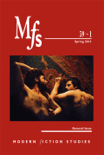
MFS-Modern Fiction Studies
Scope & Guideline
Advancing Scholarship in Modern Fiction
Introduction
Aims and Scopes
- Interrogation of Identity and Subjectivity:
The journal focuses on narratives that explore diverse identities, including race, gender, sexuality, and class, often utilizing intersectional frameworks to analyze how these identities shape literary expression. - Critical Engagement with Social and Political Issues:
MFS publishes works that analyze literature in relation to pressing social and political concerns, such as immigration, neoliberalism, and postcolonialism, highlighting the role of fiction in reflecting and challenging societal norms. - Exploration of Modernist and Contemporary Literary Forms:
The journal emphasizes both modernist texts and contemporary literature, examining how narrative forms and styles evolve in response to cultural and historical contexts. - Theoretical Innovation in Literary Criticism:
MFS encourages the application of new theoretical approaches to literary texts, incorporating perspectives from cognitive science, queer theory, and posthumanism, thus expanding the boundaries of traditional literary criticism. - Transnational and Global Perspectives:
The journal promotes scholarship that considers literature in a global context, addressing transnational narratives and the impact of globalization on literary production and interpretation.
Trending and Emerging
- Intersectionality in Literature:
An increasing number of papers are exploring intersectional identities, examining how race, gender, and sexuality overlap in literary texts, which is crucial for understanding the complexities of character and narrative. - Digital Humanities and Computational Criticism:
There is a notable rise in studies employing digital humanities methodologies, particularly in analyzing online literary communities and the impact of technology on narrative forms and reader engagement. - Environmental and Ecocritical Themes:
Emerging discussions around climate crisis literature and ecocriticism are gaining traction, reflecting a broader societal concern for environmental issues and their representation in modern fiction. - Queer and Trans Narratives:
The journal is increasingly publishing works that focus on queer and trans experiences, highlighting the importance of these identities in contemporary literature and cultural discourse. - Globalization and Transnational Narratives:
Recent issues have seen a surge in articles addressing globalization's impact on literature, exploring how transnational narratives reflect the complexities of migration, diaspora, and cultural exchange.
Declining or Waning
- Traditional Historical Narratives:
There is a noticeable decrease in papers focused on conventional historical narratives, as the journal increasingly favors contemporary issues and innovative narrative forms that challenge linear storytelling. - Purely Formalist Criticism:
The focus on purely formalist approaches has waned, with fewer articles dedicated solely to the analysis of form without considering broader socio-political implications or authorial intent. - Canonical Literary Studies:
The examination of canonical texts in isolation has diminished, suggesting a shift towards more inclusive analyses that incorporate diverse voices and lesser-known authors in the modern literary canon. - Static Gender Roles in Literature:
Works that reinforce static, traditional gender roles are less frequently published, indicating a move towards dynamic explorations of gender fluidity and queer identities. - Homogeneous Cultural Perspectives:
There is a decline in studies that present a singular cultural perspective, as MFS increasingly highlights multicultural and transnational narratives that reflect a more global literary landscape.
Similar Journals

LITERATUR UND KRITIK
Advancing Conversations in Literature and TheoryLITERATUR UND KRITIK, published by Otto Muller Verlag, stands as a significant journal in the field of Literature and Literary Theory. This Austrian journal, with its ISSN 0024-466X, offers a platform for critical examination, analysis, and discourse on literature from various historical and cultural contexts. Despite its current standing in the Q4 category of literature rankings, it provides an invaluable resource for researchers and practitioners committed to exploring the evolving landscape of literary criticism. This journal is particularly notable for its convergence of scholarly thought from 2009 to 2024, fostering a rich dialogue among academics, critics, and students alike. While it does not offer open access, its valuable insights into contemporary and historical literary studies make it a respected source within the academic community. The journal ensures that contributors and readers alike engage deeply with significant literary themes, nurturing both scholarly and creative pursuits.

STAND
Advancing Scholarly Discourse in the Arts and HumanitiesSTAND is a distinguished academic journal dedicated to the critical analysis and exploration of literature and literary theory, published by the reputable STAND collective. With a history of publication spanning from 2002 to 2017, this journal offers an invaluable platform for scholars, researchers, and students engaged in the arts and humanities. Although coverage has been discontinued in Scopus, the journal has maintained a notable rank of #620 out of 793 in its category, placing it in the 21st percentile among its peers. STAND seeks to foster scholarly discourse, presenting articles that push the boundaries of literary criticism and theory, enriching the academic landscape of literature studies. While it operates under a traditional access model, it remains a vital resource for those looking to deepen their understanding of literary practices and critical methodologies, with contributions from influential voices in the field.

TWENTIETH CENTURY LITERATURE
Engaging with the Rich Tapestry of 20th Century NarrativesTWENTIETH CENTURY LITERATURE is a renowned journal published by Hofstra University Press, dedicated to the exploration and analysis of literature and literary theory from the twentieth century. With a focus on both established and emerging voices in the field, this journal serves as an essential resource for researchers, professionals, and students who seek to deepen their understanding of significant literary movements and trends. The journal holds an impressive Q2 category ranking in Literature and Literary Theory as of 2023, showcasing its impact and relevance in the academic community. Though not an open access journal, it provides valuable insights and scholarly discussions that contribute to ongoing debates in literature studies. Covering a converged period from 2002 to 2014 and continuing from 2016 to 2024, TWENTIETH CENTURY LITERATURE positions itself as a pivotal platform for thought-provoking literature critique and scholarly inquiry, making it an indispensable addition to any academic library or personal collection.

Belphegor
Advancing Critical Discourse in French StudiesBelphegor is a distinguished open-access academic journal published by the Department of French at Dalhousie University, specializing in the fields of French literature, cultural studies, and linguistics. With its ISSN 1499-7185, the journal has been an essential resource for researchers and academics since its inception in 2011, providing a platform for innovative scholarship and critical discourse. Located in Halifax, Canada, the journal encourages the exploration of contemporary and historical issues within the Francophone world, aiming to foster intercultural dialogue and understanding. Through its commitment to accessible research, Belphegor significantly contributes to the academic landscape, making valuable contributions to both local and international scholarly communities.
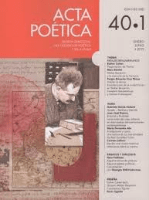
Acta Poetica
Exploring the Depths of Literary DiscourseActa Poetica is a distinguished open-access journal dedicated to advancing research and scholarship in the fields of Cultural Studies and Literature and Literary Theory. Published by the Universidad Nacional Autónoma de México through its Instituto de Investigaciones Filológicas, this journal has been a pivotal platform for the dissemination of literary discourse since it embraced open access in 1979. With a notable presence in both the social sciences and humanities, Acta Poetica has earned a ranking of Q3 and Q2 in the 2023 category quartiles, reflecting its commitment to quality scholarship. The journal invites contributions from researchers, professionals, and students alike, fostering a rich dialogue that explores the nuances of literary criticism and cultural phenomena. With its ISSN 0185-3082 and E-ISSN 2448-735X, the journal aims to make valuable research accessible to a global audience, continuing its legacy of enhancing literary scholarship from its base in Mexico City.
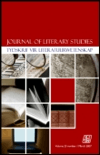
Journal of Literary Studies
Exploring the depths of literature and theory.Journal of Literary Studies, published by UNISA PRESS, is a premier open access journal dedicated to advancing the field of literature and literary theory. With its ISSN 0256-4718 and E-ISSN 1753-5387, the journal has established itself as a leading platform for innovative research since its inception in 1985, with a notable convergence period running through to 2024. Recognized in the Q1 quartile of literature and literary theory, the journal ranks impressively at #236 out of 1106 in its category according to Scopus, highlighting its impact in the arts and humanities with a percentile rank of 78th. The journal's open access model, adopted in 2022, reflects its commitment to accessibility and dissemination of knowledge globally, making it an essential resource for researchers, academics, and students alike. With an editorial focus on interdisciplinary approaches and contemporary critical discourse, the Journal of Literary Studies serves as a vital vessel for the exchange of ideas and scholarly dialogue in the intricate landscape of literary studies.
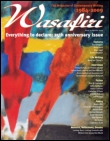
Wasafiri
Advancing critical insights in global discourse.Wasafiri, published by Routledge Journals, Taylor & Francis Ltd, stands as a pivotal platform in the fields of Cultural Studies and Literature and Literary Theory. With a proud publication history extending from 1984 to 2024, this esteemed journal delivers critical insights and cutting-edge research that explore the intersections of culture, literature, and global discourse. Renowned for its academic rigor, Wasafiri holds a Q3 ranking in both its categories as of 2023, showcasing its solid contributions to the scholarly community, reflected in its respectable Scopus rankings—evidencing its relevance and authority, particularly in the literature field. While available through subscription, the journal emphasizes the dissemination of diverse voices and innovative scholarship, appealing to researchers, professionals, and students eager to deepen their understanding of contemporary cultural narratives. Positioned in the United Kingdom, Wasafiri continues to foster vibrant dialogues that challenge conventional paradigms, making it an invaluable resource for anyone engaged in the humanities.

Current Writing-Text and Reception in Southern Africa
Pioneering Research in Southern African Literary StudiesCurrent Writing-Text and Reception in Southern Africa is a premier journal published by Routledge Journals, Taylor & Francis Ltd., specializing in the vibrant field of Literature and Literary Theory. With ISSN 1013-929X and E-ISSN 2159-9130, this journal has been a pivotal platform for scholarly discourse since its inception in 1989, continuing through to 2024. Located in the United Kingdom, it emphasizes the uniquely diverse literary landscape of Southern Africa, making it an essential resource for researchers, professionals, and students who engage with the rich cultural narratives of the region. Ranking in the Q3 category for Literature and Literary Theory, it holds a commendable position in the Scopus ranks, situated at #424/1106 with a 61st percentile, highlighting its influence and relevance in academic discussions. Though not open access, this journal serves as a vital conduit for innovative research, critical analysis, and theoretical exploration, underpinning the significance of text and reception in contemporary literary studies.
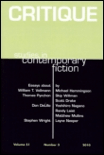
CRITIQUE-STUDIES IN CONTEMPORARY FICTION
Exploring the Depths of Contemporary NarrativesCRITIQUE: STUDIES IN CONTEMPORARY FICTION is a premier scholarly journal published by Routledge Journals, Taylor & Francis Ltd, dedicated to advancing our understanding of contemporary fiction within the broader spectrum of literature and literary theory. With an esteemed reputation in the academic community, this journal has achieved a remarkable impact factor and ranks in the Q1 category in Literature and Literary Theory, showcasing its influence and credibility, as reflected in its Scopus Rank of #142 out of 1,106 and a notable 87th percentile. The journal invites researchers, scholars, and students to engage with innovative perspectives, critical analysis, and interdisciplinary exploration of contemporary narratives. Published continuously since 1956, CRITIQUE serves as a vital resource for those seeking to understand the complexities of modern literature, and it remains committed to fostering dialogue around diverse textual and cultural contexts.
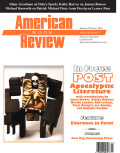
AMERICAN BOOK REVIEW
Championing Innovative Insights in LiteratureAMERICAN BOOK REVIEW is a pivotal journal in the fields of Cultural Studies and Literature and Literary Theory, published by the University of Houston, Victoria - Art & Science. Esteemed for its critical engagement with contemporary literary discourses, the journal provides a platform for scholars and practitioners to explore diverse narratives and theoretical frameworks that shape our understanding of literature. With an ISSN of 0149-9408 and E-ISSN 2153-4578, it serves as an essential resource for those seeking to deepen their insights into the intersection of literature and culture. Although positioned in the Q4 category for both Cultural Studies and Literature in 2023, the journal emphasizes the importance of inclusivity in academic dialogue, aiming to elevate lesser-heard voices in literary critique. Despite its challenging Scopus ranking, its commitment to fostering innovative scholarship makes it a noteworthy asset for researchers, professionals, and students alike. The journal's address is located at 3007 N Ben Wilson, Victoria, TX 77901, United States.